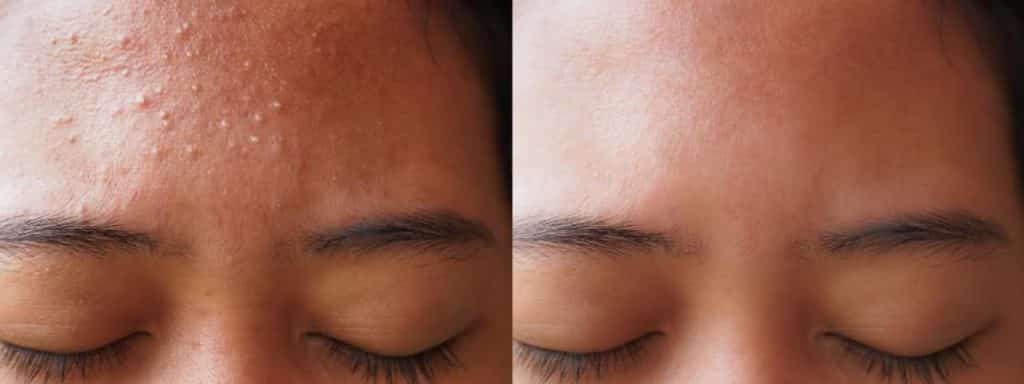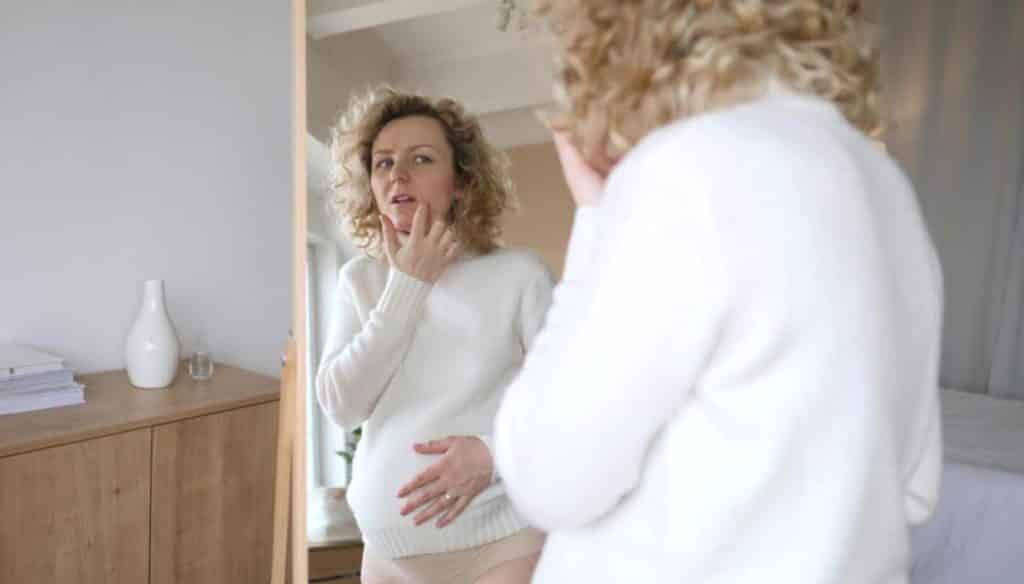For most women, pregnancy comes with a world of changes. From belly button changes to the mom butt issue, and even developing acne during pregnancy. If you’re in these shoes, there’s really no cause for alarm. You are not alone, and just like many women around the world, you’d find answers to the causes, remedies, and solutions to acne during pregnancy in this article.

Don’t stop reading.
What is Pregnancy Acne?
While expecting, the accompanying hormonal fluctuations may lead to skin changes during pregnancy like breakouts or acne. In fact, studies show that at least 5 in 10 women would have acne during pregnancy.
Thankfully, understanding the causes and possible treatment of acne in pregnancy may prevent scarring and reduce discomfort on this journey.
You can also read this article to learn about the causes and treatment of perimenopausal acne.
Causes of Pregnancy Acne
As we mentioned earlier, elevated or fluctuating hormone levels during pregnancy can lead to pregnancy-related acne. In fact, high hormone levels increase natural oil production in a woman’s skin. Although it is really difficult to predict who would or wouldn’t have acne during pregnancy, it may also be related to genetic and environmental factors.
In plain terms, women who experienced acne and skin changes during puberty have a higher chance of having acne during pregnancy. Thankfully, if you don’t get acne in the first trimester, it’s unlikely that you’ll experience unusual breakouts in the second or third trimesters.
Treatment of Pregnancy Acne
Managing acne while pregnant can be difficult.
Women can treat pregnancy acne with medication or natural remedies. Nonetheless, medical treatments often come with significant risks of birth abnormalities associated with numerous prescription and over-the-counter medicines.

Although over-the-counter (OTC) and prescription acne remedies exist, women may have concerns about the possible risks of using these products during pregnancy. In general, you should avoid any drug that even slightly increases the risk that your child will suffer injury.
Medication
According to research, there are numerous medications that can increase the risk of congenital disabilities and pregnancy complications during the period of your pregnancy. Some of these medications include:
- Hormonal therapy
- Isotretinoin
- Oral tetracyclines
- Topical retinoids
The good news is: The task of treating acne during pregnancy is not impossible.
Acne products containing salicylic acid, benzoyl peroxide, and erythromycin are suitable for acne treatment. Beta hydroxy acids such as salicylic acid aid to treat acne by removing dead skin cells that clog pores. Furthermore, acne-causing bacteria are killed by benzoyl peroxide, which also removes excess oil and dead skin cells from pores.
Home Remedies
Pregnant women can also attempt using natural remedies for their acne conditions. Natural remedies are the safest and most reliable solution because there are minimal or no risks. These natural remedies may be from nutrients in food consumed or by application to the skin.
Here are a few options to try:
Zinc
Zinc is a crucial mineral that promotes cell division and protein production. According to recent research, pregnant women or nursing moms face an increased risk of zinc insufficiency. Therefore, they are advised to consume 11–13 milligrams (mg) of zinc per day.
The health risks of zinc deficiency include:
- Reduced immune function
- Loss of appetite
- Delayed sexual maturation
- Postpartum hair loss
- Skin lesions
On the other hand, higher zinc levels can reduce the severity of acne in pregnancy, according to studies. The results of a study showed that erythromycin and zinc acetate combined as a topical acne therapy is more effective than erythromycin alone in a gel form.
Food items that are rich in zinc include; oysters, meat, beef, pork, poultry, shellfish, beans, nuts, seeds, and yogurt.
Honey
The anti-inflammatory and antibacterial effects of several honey constituents may be used to treat acne. Applying honey directly to acne blemishes can be used as a spot therapy option. They can also combine honey with a few drops of lemon juice or lavender oil to create a face mask.

Vitamin A
Vitamin A contains a group of chemical compounds called retinoids. These retinoids support a wide range of important body functions, including:
- Immune function
- Vision
- Reproduction
- Communication between cells
Topical retinoids help lessen acne symptoms and stop new acne lesions from developing. They continue to be the primary method of treating acne. However, because some retinoid drugs have the potential to result in congenital defects as earlier discussed, pregnant women should consult with a doctor before using these treatments.
Food sources rich in vitamin A, include; beef, liver, chicken, eggs, fish, vegetables, fruits, and fortified dairy products.
Pregnancy Acne Prevention
The safest course of action is good skin care. Here are some drug-free ways to treat pregnancy acne:
- Avoid irritants
- Wash with gentle, oil-free, alcohol-free, and a non-abrasive cleanser
- Avoid over-cleansing so as not to overstimulate the skin’s oil glands
- Apply shampoo regularly. If you have oily skin, it’s best to use daily
- Change bed sheets and pillowcases frequently
- Do not squeeze blemishes as they can result in infection and scarring
- Watch what touches your skin because it may contain bacteria
Is Acne a Sign of Pregnancy?
Despite the fact that many women get acne during pregnancy, being pregnant is not always indicated by the presence of acne. Hormonal changes can lead to acne development. During their periods, some women may have fresh breakouts. Health issues that impact hormone levels may also cause acne.
Conclusion
Skin alterations are frequent during pregnancy. While other women might observe their acne clearing up, some women may experience more severe breakouts. Most over-the-counter topical acne medications for pregnant acne like erythromycin are safe to use on women. Retinoids and oral acne medications should be avoided by women who are expecting or nursing. However, consuming meals high in zinc and vitamin A may help lessen acne symptoms. Furthermore, honey is another effective acne therapy option.
Nevertheless, if you are concerned about pregnancy acne, it is best you consult your doctor. You can both weigh the benefits and risks of possible treatment options.

